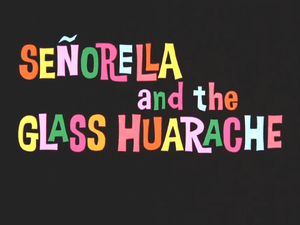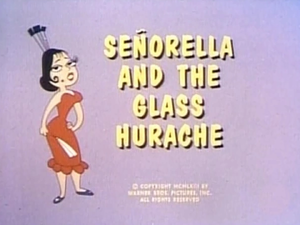Difference between revisions of "Señorella and the Glass Huarache"
From Looney Tunes Wiki
Jump to navigationJump to search
(Created page with "{{DISPLAYTITLE:''Señorella and the Glass Huarache''}} {{Infobox movie |image= |caption= |prodcompany= Warner Bros. Cartoons |distributor= Warner Bros. Pictures |released= August 1, 1964 |run_time= |starring= Mel Blanc<br />Tom Holland |producers= David H. DePatie |music= Bill Lava |story= John Dunn |animation= Gerry Chiniquy<br />Bob Matz<br />Virgil Ross<br />Lee Halpern |director= Hawley Pratt |previous= Flase...") |
m (→Errors) |
||
| (10 intermediate revisions by 2 users not shown) | |||
| Line 13: | Line 13: | ||
|animation= [[Gerry Chiniquy]]<br />[[Bob Matz]]<br />[[Virgil Ross]]<br />[[Lee Halpern]] | |animation= [[Gerry Chiniquy]]<br />[[Bob Matz]]<br />[[Virgil Ross]]<br />[[Lee Halpern]] | ||
|director= [[Hawley Pratt]] | |director= [[Hawley Pratt]] | ||
|previous= | |previous= False Hare | ||
|next= Pancho's Hideaway | |next= Pancho's Hideaway | ||
|title_card= [[File:Señorella and the Glass Huarache title card.png|300px]] | |title_card= [[File:Señorella and the Glass Huarache title card.png|300px]] | ||
|title_card2= [[File:Señorella and the Glass Huarache TV Title Card.png|300px]] | |||
}} | }} | ||
'''''Señorella and the Glass Huarache''''' is the three hundred and ninety-third ''[[Looney Tunes (theatrical shorts)|Looney Tunes]]'' theatrical short. It was distributed by [[Warner Bros. Pictures]] on [[August 1]], [[1964]]. It was written by [[John Dunn]], produced by [[David H. DePatie]], and directed by [[Hawley Pratt]]. | '''''Señorella and the Glass Huarache''''' is the three hundred and ninety-third ''[[Looney Tunes (theatrical shorts)|Looney Tunes]]'' theatrical short. It was distributed by [[Warner Bros. Pictures]] on [[August 1]], [[1964]]. It was written by [[John Dunn]], produced by [[David H. DePatie]], and directed by [[Hawley Pratt]]. | ||
Tired of her slavish living under her wicked "strapmother" and "strapsisters", a young woman named Señorella wishes to go on a fiesta at the estate of a bullfighter's father. | The classic story of ''Cinderella'' is retold in a Mexican-type rendition: Tired of her slavish living under her wicked "strapmother" and "strapsisters", a young woman named Señorella wishes to go on a fiesta at the estate of a bullfighter's father. | ||
==Detailed summary== | ==Detailed summary== | ||
| Line 68: | Line 69: | ||
* Layouts: [[Hawley Pratt]] | * Layouts: [[Hawley Pratt]] | ||
* Backgrounds: [[Tom O'Loughlin]] | * Backgrounds: [[Tom O'Loughlin]] | ||
* Effects | * Effects Animation: [[Harry Love]] | ||
* Film | * Film Editor: [[Treg Brown]] | ||
==Release== | ==Release== | ||
| Line 78: | Line 79: | ||
==Behind the scenes== | ==Behind the scenes== | ||
* The MPAA certificate number is 197733 | * The MPAA certificate number is 197733 | ||
* As stated above, it is a Mexican retelling of the ''[[Cinderella]]'' fairy tale. | |||
* The opening and closing titles are reused from ''[[Now Hear This]]'' and ''[[Bartholomew Versus the Wheel]]''. | |||
* It rarely airs on U.S. television due to its heavy stereotyping on Mexicans. | |||
==Everlasting influence== | ==Everlasting influence== | ||
* The short was the final theatrical release of the ''Looney Tunes'' series before the shutdown of the [[Warner Bros. Cartoons]] division, although it was not the last one produced, as it would go to ''[[False Hare]]'', which was released about a month prior. | * The short was the final theatrical release of the ''Looney Tunes'' series before the shutdown of the [[Warner Bros. Cartoons]] division, although it was not the last one produced, as it would go to ''[[False Hare]]'', which was released about a month prior. | ||
* | * Starting in 1965, the abstracted intro and outro sequences would be used for the rest of the series. | ||
==Errors== | ==Errors== | ||
* | * On the short's title card used for ''[[The Merrie Melodies Show]]'', the word "Huarache" is spelled wrong. | ||
==Critical reception== | ==Critical reception== | ||
==Home availability== | ==Home availability== | ||
* United States | * United States | ||
Latest revision as of 20:33, 4 June 2024
| Señorella and the Glass Huarache | |
|---|---|
| Production company | Warner Bros. Cartoons |
| Distributor | Warner Bros. Pictures |
| Release date | August 1, 1964 |
| Starring | Mel Blanc Tom Holland |
| Producer(s) | David H. DePatie |
| Music composed by | Bill Lava |
| Story by | John Dunn |
| Animation | Gerry Chiniquy Bob Matz Virgil Ross Lee Halpern |
| Director(s) | Hawley Pratt |
| Series navigation | |
| ← Previous | Next → |
| Title card | |

| |
| Second title card | |

| |
Señorella and the Glass Huarache is the three hundred and ninety-third Looney Tunes theatrical short. It was distributed by Warner Bros. Pictures on August 1, 1964. It was written by John Dunn, produced by David H. DePatie, and directed by Hawley Pratt.
The classic story of Cinderella is retold in a Mexican-type rendition: Tired of her slavish living under her wicked "strapmother" and "strapsisters", a young woman named Señorella wishes to go on a fiesta at the estate of a bullfighter's father.
Detailed summary
Memorable quotes
Man: It was not sad. It was a happy story. But what happened to the strapmother?
Storyteller: Ah, that's the sad part. I marry her.
Characters
In order of appearance: | ||||||||||||||
| ||||||||||||||
Locations
Objects
- Glass huarache
Vehicles
- Car with "mucho married" sign
Production
Development
Filming
Music
The music was composed by Bill Lava.
Crew credits
- Layouts: Hawley Pratt
- Backgrounds: Tom O'Loughlin
- Effects Animation: Harry Love
- Film Editor: Treg Brown
Release
Dates are in order of release:
- United States: August 1, 1964 in theatres
Behind the scenes
- The MPAA certificate number is 197733
- As stated above, it is a Mexican retelling of the Cinderella fairy tale.
- The opening and closing titles are reused from Now Hear This and Bartholomew Versus the Wheel.
- It rarely airs on U.S. television due to its heavy stereotyping on Mexicans.
Everlasting influence
- The short was the final theatrical release of the Looney Tunes series before the shutdown of the Warner Bros. Cartoons division, although it was not the last one produced, as it would go to False Hare, which was released about a month prior.
- Starting in 1965, the abstracted intro and outro sequences would be used for the rest of the series.
Errors
- On the short's title card used for The Merrie Melodies Show, the word "Huarache" is spelled wrong.
Critical reception
Home availability
- United States